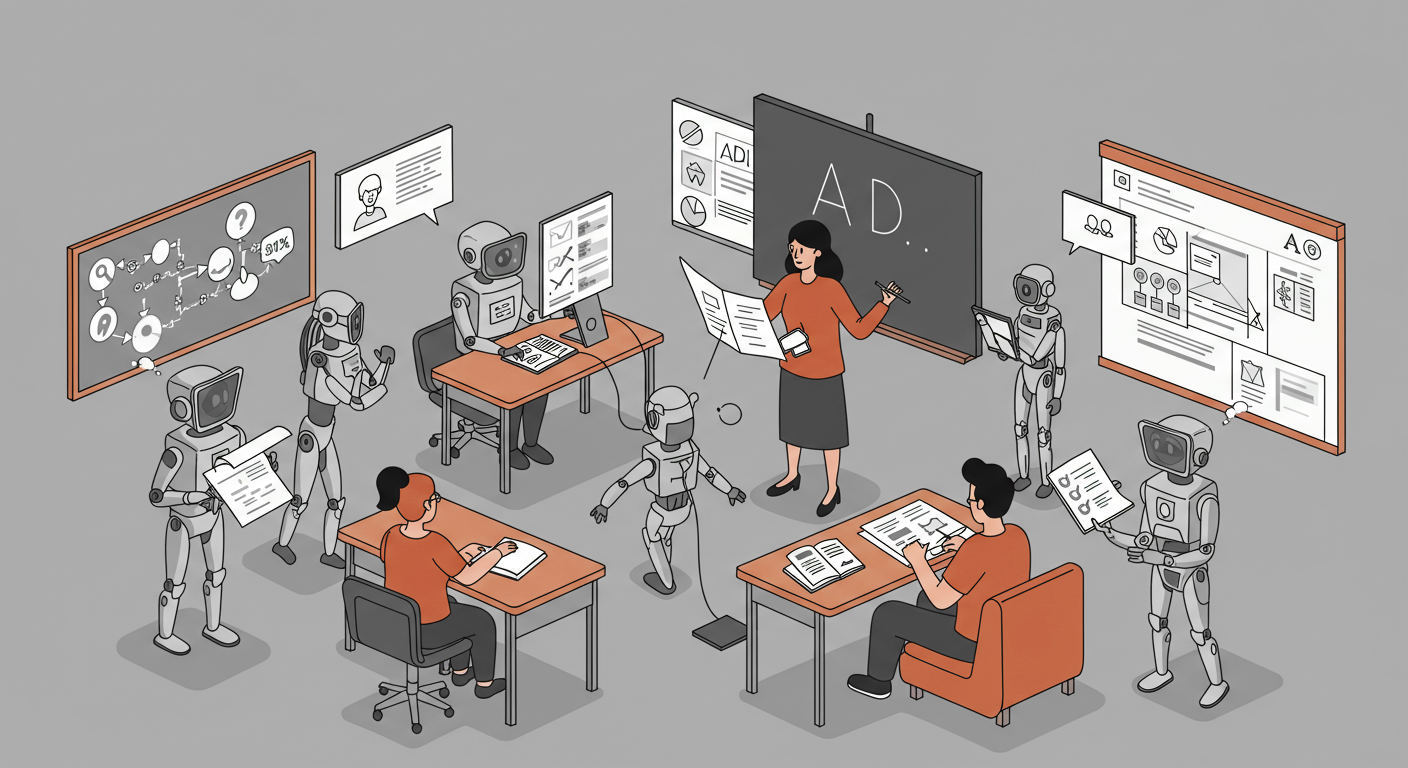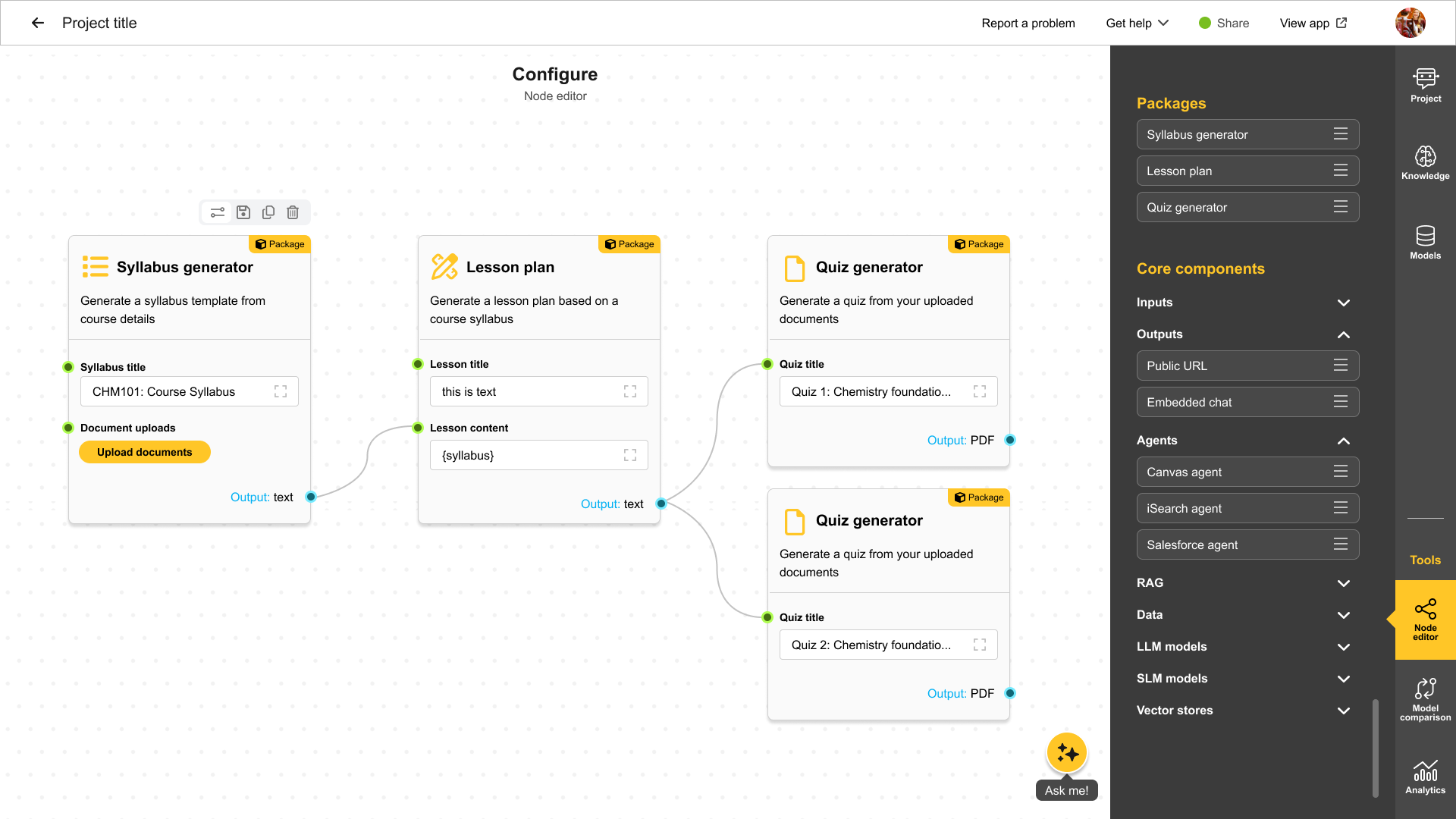
Agents in Generative AI
A more personalized student-centered experience at scale.
The path to access and success is paved with innovative, interdisciplinary efforts that democratize education, ensuring every student benefits from personalized learning experiences.
Agents
Agents in generative AI are semi-autonomous entities that collaborate and interact dynamically allowing them to solve complex problems and combine specialized capabilities for greater efficiency and adaptability.
More practically, an agent can be thought of as a GPT designed for a specific, narrow task.
An Agentic Framework is a workflow system that allows these Agents to work together through clearly defined communication protocols and structured workflows such as approvals, loops, and external integrations.
General Characteristics of an Agent (like a GPT):
- Specialization: Each agent has a specific role or expertise, such as generating content, analyzing data, or orchestrating tasks.
- Collaboration: Agents communicate and work together via an Agentic Framework such as AutoGen.
- Reusability: Agents can function independently or as part of a larger agent team.

Imagine a Course Builder AI Using this Agentic Framework
Now that we’ve explored the foundational concepts of agents, let's see how they come together in a real-world application with various roles. Imagine a Course Builder AI—a system designed to streamline and automate the course creation process. By leveraging specialized agents, this AI can efficiently draft course structures, generate learning materials, and manage approvals, all while ensuring alignment with institutional standards.
Here’s how these agents could contribute to the workflow:
- Facilitator: Oversees other agents, maps out all the steps for drafting an ASU course, and manages the approval workflow for course creation.
- Outline & Learning Objectives Creator: Reviews course content, suggests modules, outlines lecture topics, creates learning objectives, proposes discussion points, and designs assessment/grading elements.
- Syllabus Creator: Creates a syllabus for the course given the outline Module Creator: Drafts a module based on the course content
- Lecture Scripter: Develops lecture scripts and presentation flows
- Assessment Creator: Designs specific assessments for each module based on its content.

The Future of CreateAI and MyAI Builder
The future of AI-driven workflows moves beyond traditional interfaces, enabling more dynamic and integrated experiences. By leveraging advanced models, retrieving relevant data, and incorporating enterprise tools, this approach enhances automation, adaptability, and user interaction across multiple platforms. Below are key elements shaping this evolution:
- Flow Builder Instead of a Form-Based UI
- Stitch together multiple LLM models
- Fetch data from multiple RAG indexes
- Mix between multimodal models
- Create & Integrate Agents into your flow
- Enterprise Tools for Agents integrating Enterprise data sources (Canvas, iSearch, Salesforce, Data Warehouse etc)
- Custom tools enabling integration of any external source
- Multiple different experience options (Chat, Canvas, Webpage, Push, SMS, Slack etc)
- Context enrichment from Peoplesoft/Canvas/Salesforce/Warehouse
- Small Language Models
Keep Reading
Understanding URL Uploads and Indexing in CreateAI
The URL upload feature in CreateAI lets you index content from public ASU websites into your project’s knowledge base. This article explains how page depth works, how indexing levels affect what gets captured, and how to avoid common upload issues.
CreateAI Project Analytics Dashboard
The Analytics Dashboard, integrated into your CreateAI workspace, gives you real-time visibility into user engagement, usage trends, and project impact. Designed to support faculty, researchers, and builders alike, this feature helps you move from intuition to insight.
CreateAI APIs and Other Generative AI Access Options at ASU
Looking to build with generative AI at ASU? Your pathway to API access depends on your use case. This guide explains the approved routes for research, enterprise initiatives, and individual projects and how to get started.
